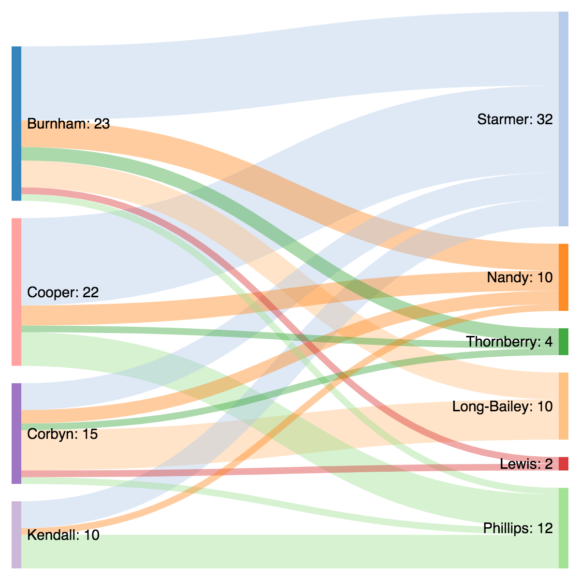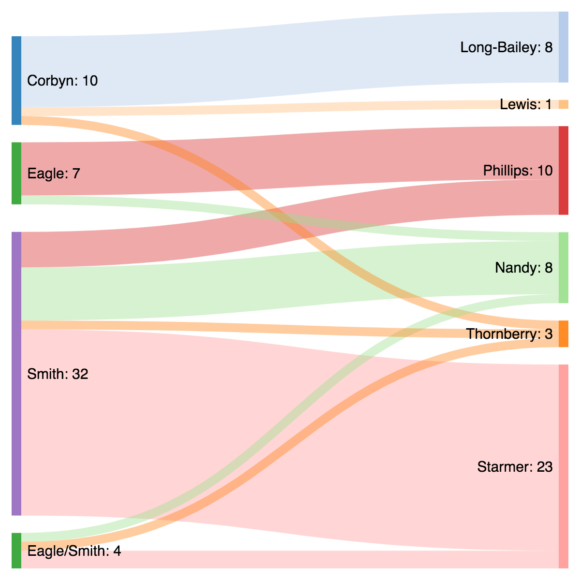The race to succeed Jeremy Corbyn is now underway, with contenders competing for the 22 MP and MEP nominations they need to make it through to the contest’s next round. That these nominations are made public provides a fascinating insight into the dynamics at play in the Parliamentary Labour Party (PLP) and allows us to delve back to previous leadership elections to see how they inform the current one.
By comparing MP nominations from the 2015 leadership election, when Jeremy Corbyn was elected, to who MPs are backing now, we see that the picture is probably far messier than much of the coverage of Labour’s internal factionalism would suggest—particularly among the party’s “moderate” or right wing.
It might be assumed that there would be clear ‘Corbynite’, ‘Blairite’ or ‘soft left’ patterns to explain MP’s behaviour—but 2015 support basically fragments across all the current candidates.

Yet, there are a number of interesting patterns we can draw out at this stage. The left’s frontrunner Rebecca Long-Bailey, as might be expected, draws significant support from MPs who had previously nominated Corbyn, but also picks up a decent chunk of her backers from those who nominated Andy Burnham. The ‘continuity Corbyn’ label, then, does not fairly describe her MP support, and is certainly not putting off some who were previously reluctant to back Corbyn. Her ability to draw a broader base of support within the PLP, bolstered by a newly-elected group of more left-wing MPs at the general election, points to a far easier path to the ballot than Corbyn faced four years ago.
Keir Starmer, apparently ahead among members according to YouGov and well-ahead in MP nominations, draws his support from backers of all five 2015 candidates. The biggest groups of these come from Burnham and Yvette Cooper—perhaps not surprising given that they both picked up the most nominations in 2015.
But Starmer has also received backing from previous Liz Kendall and Corbyn nominators. Seen as a candidate from the centre of the Party, this might not be entirely shocking—and it appears his campaign video brandishing his more left-leaning background has not deterred MPs who had previously aligned themselves with candidates labelled as “Blairites” and “Brownites.”
Following media reports of a strong showing at the PLP hustings, Lisa Nandy, too, picks up support from across the board, but in far smaller numbers than Starmer, while Jess Phillips draws most of her nominators from previous Kendall and Cooper supporters.
What, then, can we learn about the factors motivating MPs in their nominations? It’s important to remember that the 2015 leadership election was distinct because a large number of MPs nominating Corbyn did so to “widen the debate,” or because they faced significant pressure from their constituency parties to do so. Many of these MPs did not go on to back him in the ensuing election, and a number of them have since expressed regret for lending their nominations. This explains why Jess Phillips, clearly not a “Corbynite,” has picked up one Corbyn nominator: Neil Coyle, also clearly not a “Corbynite.”
Corbyn’s 2016 backers give a more accurate picture of the MPs who were actually supportive of him. Here, we see all but Clive Lewis and Emily Thornberry, both standing themselves, nominating Rebecca Long-Bailey.
Looking at those MPs who nominated challengers Angela Eagle and Owen Smith in 2016 in a bid to oust Corbyn, none have nominated the two left-most candidates in the race—Lewis and Long-Bailey—while Thornberry, who remained largely loyal to Corbyn and is struggling for nominations, has won over two Corbynsceptics.
It is interesting that all of those who only backed Eagle in 2016 and declined to then nominate Smith when she dropped out have backed women candidates in the current contest, perhaps indicating a desire among this group to finally see Labour elect a woman leader. By contrast, significant sections of Cooper and Kendall’s nominators have transferred to Starmer in the 2020 race, suggesting for these MPs getting a leader from a certain part of the party is more important.

With Starmer already through to the second stage of the process and Long-Bailey very likely to make it as well, it will be interesting to see whether MPs, some still haunted by their 2015 nomination, will be willing to lend nominations to other candidates in order to widen the debate this time around.
So, if you were expecting that MPs’ behaviour would follow a clear factional line, the 2020 race as it stands will largely disappoint. The main fracture in the PLP remains between those who backed Corbyn in 2016 and those who tried to oust him.
While the left of the PLP, now much larger than in previous leadership contests, have coalesced to ensure that at least one of their number makes the election proper, for the Corbynsceptic, or even Corbyn-hostile, MPs, past behaviour provides little guide to quite what they’re up to now.












